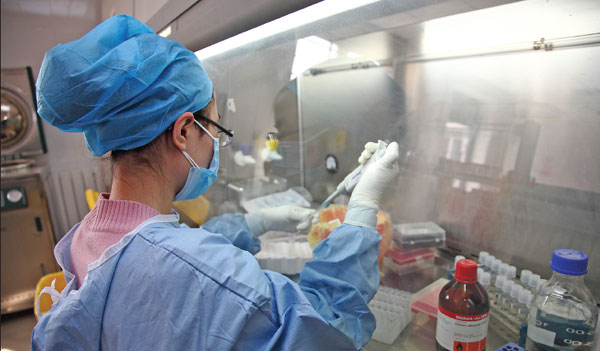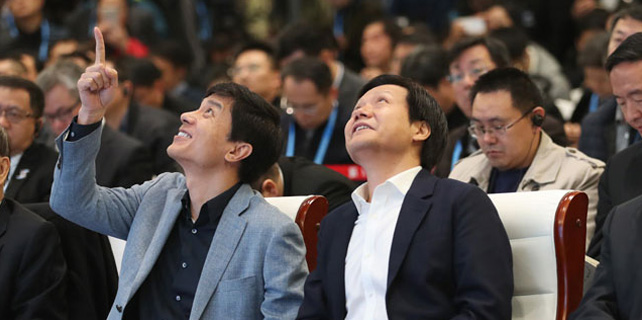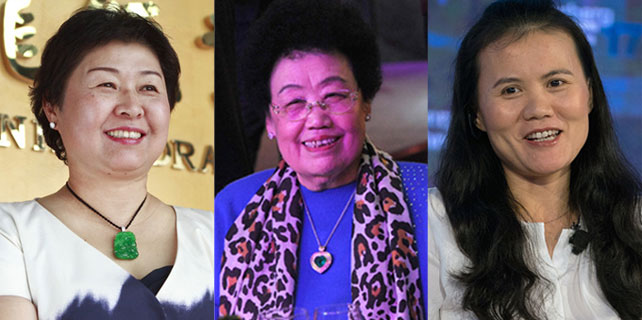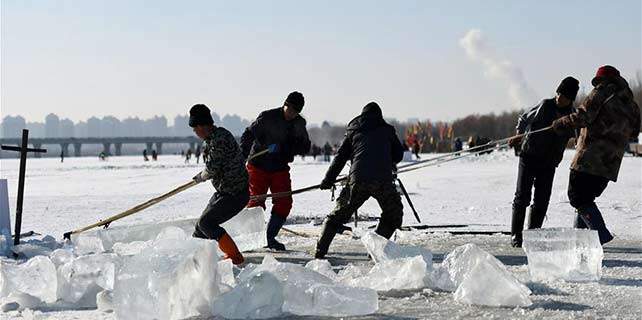China seen as ripe for top prize
US scientist who sits on Lasker Prize jury says country likely to become an international hub with stellar talent
One of the most influential scientists in the United States says China might be about to see its second winner of the Lasker Prize, a top award whose recipients often go on to become Nobel laureates.
Bruce Stillman, who sits on the 22-member prize jury, indicates in an exclusive interview that he thinks a top Beijing scientist in biomedical science will win the award in the near future.
|
An employee conducts research at a biomedical information center in Beijing. Zhang Bei / For China Daily |
He would not reveal a name, saying only that "the scientist was trained in the US and became famous in the US and then moved back to China".
Tu Youyou, the Chinese researcher and herbologist, won the Lasker in 2011 for her discovery of the anti-malarial medication artemisinin. She received the Nobel Prize in physiology or medicine four years later.
The Lasker has been awarded annually since 1945 to scientists making major contributions in medical science, and Stillman has been on the jury since 1998.
According to Nature, the international science journal, 87 percent of Lasker winners have gone on to win a Nobel.
Stillman, who visited Beijing for a conference on Dec 4, is director of the Cold Spring Harbor Laboratory in New York, a leading not-for-profit biomedical science research institution.
China has a number of excellent scientists, particularly in Beijing, he said, and all of them once held major positions at US science research institutes.
He says China is likely to become an international science hub luring top scientists from around the world, like the postwar US.
In 2008, Beijing launched the 1,000 Talent Plan, recruiting established experts from overseas to help fuel the country's advancement. The program has led to the recruitment of more than 6,000 experts in different fields, many of them scientists.
For a long time, most Chinese who wanted to be successful in life sciences went abroad to the US or Europe to do graduate work or a postdoctoral degree, and in recent years some have returned to China.
Stillman cites Shi Yigong, a biophysicist and vice-president of Tsinghua University, and Xu Ruiming, head of the Institute of Biophysics at the Chinese Academy of Science. Both were trained in the US and are "spectacular scientists", he says. Xu used to work at the Cold Spring Harbor lab.
Overseas returnees have always been a driving force in China's science development, including, in the 1950s, renowned scientists such as Qian Xuesen and Li Siguang, who returned to help with scientific and technological development.
However, Stillman stresses the importance of producing homegrown talent. "It's great for China to begin recruiting back established talent," he says. "But, like in baseball, you need a farm team as you have local talent coming up, not just hiring superstars from other teams."
To build a farm team, Stillman suggests the country should offer more opportunities for young people to develop their science careers at home. "China has a lot to offer and is surely at a point of taking off," he added.
Cold Spring Harbor provides a good example of nurturing the careers of young scientists. The center now has 52 labs and nearly 600 scientists. The average age of the scientists is in the early 30s.
"We've hired people straight out of graduate school who've gone all the way to win Nobel Prizes," he says.
Young scientists should be given resources while pursuing basic science and discoveries to think about adding value to their research so it can be translated into new drugs and biotechnology to improve people's lives, he says.
Earlier this month, Bill Gates was elected to China's top-tier science academy as the only nonacademic foreign academician. Analysts say that demonstrated China's ever increasing recognition of sci/tech transformation mentality and capacity.
Stillman says investing in the young is the secret to success at Cold Spring Harbor, and "that can be learned by China as well".
That would help generate lots of stories like that of Tu Youyou, who spent her career in China and found a new malaria treatment to benefit the world.
When asked if China could become the top science hub internationally like the postwar US, he replies "maybe".
In his opinion, the biggest barrier now is the language. "It's difficult for people to live here in China if they don't understand Chinese." But luckily, that's the only major barrier, he adds.
China has a lot to offer: smart people, a good educational system, great universities and, most importantly, a strong dedication from the top leadership to improve the nation's capabilities, such as in the sciences, he says. "I think if there is a culture here, as well, to nurture the young to develop science, it'll benefit science all over the world."
But he said the current science innovation center remains in the United States and Europe, largely due to good science opportunities and entrepreneurship. "But China has a lot to offer and can do that in the future."
In the US, Michael Rosbash, who shared this year's Nobel Prize for medicine, said scientists are facing funding cutbacks that will hurt research, the Associated Press reported.
The competition to secure research grants is getting fiercer in traditional scientific strongholds like the US, according to Professor Yaacov Ben-David, who is helping research the anti-cancer properties of herbs used in traditional Chinese medicine at the State Key Laboratory for Functions and Applications of Medicinal Plants in Guiyang, Guizhou province.
shanjuan@chinadaily.com.cn
(China Daily European Weekly 12/22/2017 page14)



















